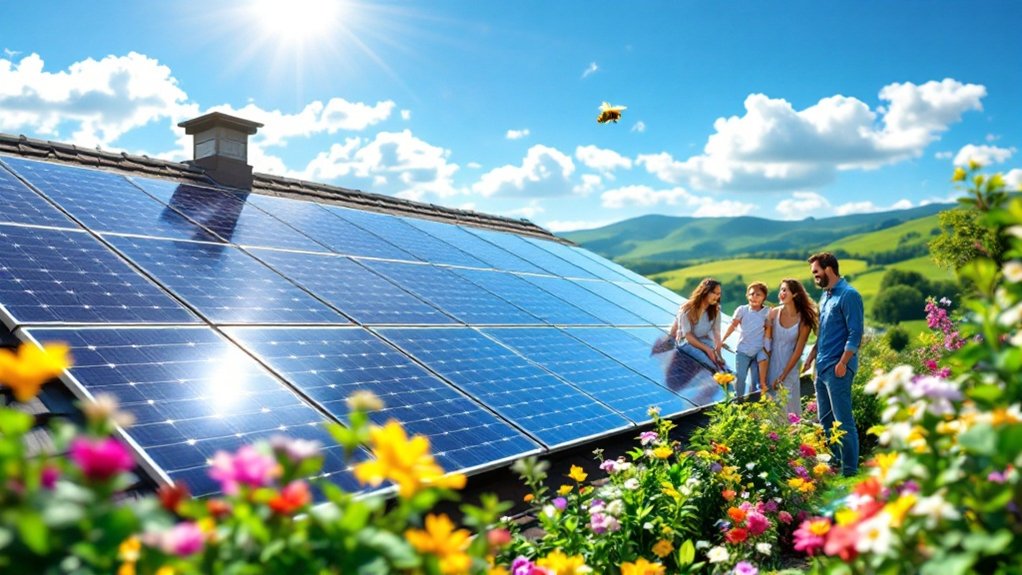
Why Solar Panels Are Essential for Sustainability
Solar panels play an important role in promoting sustainability. They provide a clean and renewable energy source, which can greatly reduce greenhouse gas emissions. The shift to solar energy not only benefits the environment but also has economic implications. As communities adopt this technology, questions arise about the broader impact on energy independence and job creation. Understanding these dynamics is essential for grasping the full importance of solar panels in the quest for a sustainable future.
The Environmental Impact of Solar Energy
Although solar energy is often lauded for its potential to reduce greenhouse gas emissions, the environmental impact of solar panels extends beyond their clean energy production. The manufacturing process of solar panels involves resource extraction, including silicon, metals, and rare earth elements, which can lead to habitat destruction and pollution. Additionally, the energy-intensive production process emits greenhouse gases, countering some benefits. End-of-life disposal presents additional environmental challenges, as improper disposal can result in toxic materials leaching into soil and water. Recycling initiatives are emerging, but they are not yet widespread. Moreover, large solar farms can disrupt local ecosystems and land use, leading to biodiversity loss. Consequently, while solar energy offers significant benefits, its environmental implications warrant careful consideration. Incorporating sustainable practices can help mitigate some of these impacts associated with solar panel production and disposal.
Economic Benefits of Solar Panel Adoption
The economic benefits of solar panel adoption extend beyond mere environmental considerations. By notably reducing energy costs over time, solar panels offer financial relief to households and businesses alike. Additionally, the shift towards renewable energy sources fosters job creation and enhances energy independence, contributing to a more resilient economy. Furthermore, investing in solar energy can significantly reduce reliance on imported fossil fuels, strengthening national energy security.
Cost Savings Over Time
As homeowners increasingly turn to solar panels for energy needs, they often discover significant cost savings over time. The initial investment in solar technology can be intimidating; however, the long-term financial benefits frequently outweigh these upfront costs. By harnessing sunlight, homeowners reduce their reliance on traditional energy sources, leading to lower monthly utility bills. Furthermore, many regions offer tax incentives and rebates that can further decrease installation expenses. Over the lifespan of a solar panel system, typically 25 years or more, the cumulative savings can be substantial, ultimately resulting in a positive return on investment. Additionally, as energy prices continue to rise, solar panels provide a hedge against fluctuating energy costs, ensuring financial stability for homeowners.
Job Creation Potential
While many focus on the environmental benefits of solar panel adoption, the potential for job creation in the renewable energy sector is equally significant. The installation, maintenance, and manufacturing of solar panels create numerous employment opportunities across various skill levels. According to recent studies, the solar industry has become one of the fastest-growing job markets, outpacing traditional energy sectors. Roles range from engineers and project managers to technicians and sales representatives, providing a diverse range of job prospects. Additionally, as more businesses and households embrace solar technology, the demand for skilled workers continues to rise, stimulating local economies. This job creation not only enhances economic stability but also fosters community resilience, making solar energy adoption a crucial component of sustainable development.
Energy Independence Advantages
Frequently, energy independence is highlighted as a key economic advantage of solar panel adoption. By harnessing solar energy, individuals and communities can reduce reliance on imported fossil fuels, thereby enhancing national security and economic stability. This shift mitigates exposure to volatile energy prices, which can strain budgets and disrupt economic planning. Additionally, local solar production keeps energy dollars circulating within the community, promoting local job growth and supporting small businesses. As energy independence increases, nations may experience a decrease in trade deficits related to energy imports, fostering a more self-sufficient economy. Ultimately, the widespread adoption of solar panels can contribute to a resilient economic framework, reducing vulnerability to external energy shocks while bolstering local economies.
Energy Independence and Security
Energy independence and security are increasingly recognized as critical components of a sustainable future, especially in the context of rising global energy demands. By adopting solar panels, nations can reduce their reliance on imported fossil fuels, mitigating vulnerabilities associated with geopolitical tensions and market fluctuations. Solar energy provides a decentralized power source, allowing communities to generate their own electricity and enhance resilience against supply disruptions. Additionally, the solar industry promotes energy diversification, which is essential for a stable energy future. As countries invest in solar technology, they bolster their energy security, decrease greenhouse gas emissions, and promote environmental stewardship. In this way, solar panels play an essential role in achieving both energy independence and long-term sustainability. Furthermore, remote work trends are increasingly influencing energy consumption patterns, leading to a greater demand for sustainable energy solutions.
Job Creation in the Renewable Energy Sector
The change to renewable energy, particularly through solar panel installation, has significant implications for job creation within local communities. This shift not only generates new employment opportunities but also fosters skill development programs aimed at equipping workers with the necessary expertise in the growing sector. As the demand for sustainable energy solutions increases, the renewable energy workforce is poised to expand, benefiting both individuals and local economies. Additionally, embracing mindfulness techniques can enhance workers’ focus and emotional well-being, further contributing to a productive workforce.
Local Employment Opportunities
Harnessing the potential of solar panels not only contributes to environmental sustainability but also stimulates local economies through job creation. The solar energy sector has been a significant driver of employment, offering a range of positions from manufacturing to installation and maintenance. Local businesses often benefit from increased demand for solar-related services, generating additional jobs within the community. Moreover, as solar projects expand, they create opportunities in research, development, and project management, promoting a diverse workforce. The proliferation of solar technology fosters economic resilience, particularly in regions evolving away from fossil fuels. Consequently, investing in solar energy not only addresses climate challenges but also enhances local employment prospects, ensuring communities thrive both economically and environmentally.
Skill Development Programs
As communities increasingly shift towards renewable energy, skill development programs play a crucial role in equipping the workforce for the demands of the solar sector. These programs are essential for fostering a skilled labor pool capable of installing, maintaining, and innovating solar technologies. By providing training in areas such as photovoltaic systems, energy efficiency, and project management, these initiatives enhance employability and promote economic growth. Additionally, partnerships between educational institutions and industry players guarantee that curricula remain relevant and aligned with market needs. As a result, skill development programs not only contribute to job creation but also support the shift to sustainable energy practices, ultimately fostering a greener economy and reducing dependence on fossil fuels.
Technological Advancements in Solar Energy
While the quest for sustainable energy solutions continues to gain momentum, significant technological advancements in solar energy are transforming how sunlight is converted into electricity. Innovations such as higher efficiency photovoltaic cells, which utilize multi-junction technology, have increased energy capture rates. Additionally, the development of bifacial solar panels allows for energy absorption from both sides, enhancing overall performance. Energy storage technologies, including advanced lithium-ion batteries, have improved the reliability of solar power by enabling energy use during non-sunny periods. Moreover, smart grid integration facilitates better management of solar energy distribution. These advancements not only boost efficiency but also reduce costs, making solar energy more accessible for consumers and businesses alike, thereby supporting the shift to a sustainable energy future. Furthermore, AI technology is playing a critical role in optimizing energy management systems for solar energy utilization.
Solar Energy and Climate Change Mitigation
Solar energy plays an essential role in mitigating climate change by considerably reducing greenhouse gas emissions associated with traditional fossil fuels. As the global demand for energy continues to rise, moving to solar power offers a sustainable alternative that generates electricity without releasing pollutants. Solar panels harness sunlight, converting it into clean energy, thereby decreasing reliance on carbon-intensive sources like coal and natural gas. Additionally, the scalability of solar technology allows for its integration into various settings, from residential rooftops to large solar farms, enhancing energy diversity. By adopting solar energy, nations can markedly lower their carbon footprints, contributing to global efforts aimed at limiting temperature rises and combating climate change. This shift is vital for fostering a sustainable future.
Financial Incentives for Solar Panel Installation
What motivates homeowners and businesses to invest in solar panel installation? Financial incentives play a vital role. Governments and local authorities often provide tax credits, rebates, and grants to reduce the initial costs associated with solar panel systems. These financial benefits can greatly decrease the payback period, making solar energy more appealing. Additionally, net metering policies allow users to sell excess energy back to the grid, creating potential revenue streams. Many utility companies offer incentives as well, additionally enhancing the financial viability of solar investments. Moreover, rising electricity prices make solar energy an attractive alternative, ensuring long-term savings. Overall, these financial incentives not only promote sustainability but also empower individuals and businesses to make environmentally conscious decisions.
The Future of Solar Energy in Sustainable Development
Financial incentives have considerably influenced the adoption of solar energy, paving the way for a promising future in sustainable development. As technological advancements continue to enhance efficiency and reduce costs, solar energy is expected to play a vital role in global energy shifts. Governments worldwide are increasingly integrating solar solutions into their sustainability agendas, recognizing their potential to reduce carbon emissions and dependence on fossil fuels. Moreover, the rise of decentralized energy systems allows communities to harness solar power independently, fostering resilience and energy security. As public awareness of environmental issues grows, investment in solar infrastructure will likely increase. The future of solar energy is bright, positioning it as a key driver for sustainable development and a cleaner, greener planet.
Frequently Asked Questions
How Long Do Solar Panels Typically Last Before Needing Replacement?
Solar panels typically last between 25 to 30 years before requiring replacement. Factors influencing their longevity include quality, installation, maintenance, and environmental conditions, which can affect their efficiency and overall performance over time.
Can Solar Panels Work in Cloudy or Rainy Climates?
Solar panels can function effectively in cloudy or rainy climates, albeit with reduced efficiency. They still capture diffuse sunlight, allowing energy production, although the total output may vary based on weather conditions and geographical location.
What Maintenance Do Solar Panels Require Over Time?
Maintenance for solar panels typically involves regular cleaning to remove dirt and debris, periodic inspections for damage or wear, and ensuring that connections remain secure. Most systems require minimal upkeep, enhancing their long-term efficiency and performance.
How Do Solar Panels Affect Property Values?
Solar panels can positively influence property values by enhancing energy efficiency and appeal. Homebuyers often appreciate reduced utility costs and environmental benefits, potentially leading to increased market demand and higher resale prices for properties equipped with solar technology.
Are There Any Aesthetic Options for Solar Panel Installations?
Solar panel installations offer various aesthetic options, including sleek designs that blend with rooflines, building-integrated photovoltaics that resemble traditional materials, and customizable colors. Such choices help homeowners maintain the visual appeal of their properties.
Conclusion
In summary, solar panels play a pivotal role in promoting sustainability by offering a clean energy alternative that reduces greenhouse gas emissions. Their economic benefits, including job creation and energy independence, further underscore their significance in fostering resilient communities. As technological advancements continue to enhance their efficiency, and financial incentives encourage wider adoption, solar energy stands as a vital element in the global effort to combat climate change and achieve sustainable development for future generations.



